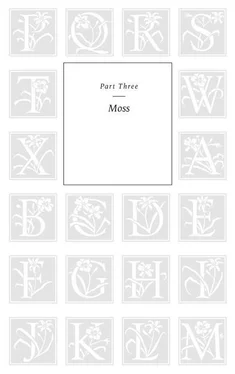Vanessa Diffenbaugh - The Language of Flowers
Здесь есть возможность читать онлайн «Vanessa Diffenbaugh - The Language of Flowers» весь текст электронной книги совершенно бесплатно (целиком полную версию без сокращений). В некоторых случаях можно слушать аудио, скачать через торрент в формате fb2 и присутствует краткое содержание. Жанр: Старинная литература, на английском языке. Описание произведения, (предисловие) а так же отзывы посетителей доступны на портале библиотеки ЛибКат.
- Название:The Language of Flowers
- Автор:
- Жанр:
- Год:неизвестен
- ISBN:нет данных
- Рейтинг книги:4 / 5. Голосов: 1
-
Избранное:Добавить в избранное
- Отзывы:
-
Ваша оценка:
- 80
- 1
- 2
- 3
- 4
- 5
The Language of Flowers: краткое содержание, описание и аннотация
Предлагаем к чтению аннотацию, описание, краткое содержание или предисловие (зависит от того, что написал сам автор книги «The Language of Flowers»). Если вы не нашли необходимую информацию о книге — напишите в комментариях, мы постараемся отыскать её.
The Language of Flowers — читать онлайн бесплатно полную книгу (весь текст) целиком
Ниже представлен текст книги, разбитый по страницам. Система сохранения места последней прочитанной страницы, позволяет с удобством читать онлайн бесплатно книгу «The Language of Flowers», без необходимости каждый раз заново искать на чём Вы остановились. Поставьте закладку, и сможете в любой момент перейти на страницу, на которой закончили чтение.
Интервал:
Закладка:
“Where do you live?” Elizabeth asked.
“I have an apartment. A business, too. I arrange flowers for weddings, anniversaries, that kind of thing.”
“Grant says you’re amazing. He told me women line up for blocks, wait months to buy flowers from you.”
I shrugged. “Everything I know,” I said, “I learned here.”
I looked around, remembering the afternoon Elizabeth sliced open a lily on a cutting board at this same kitchen table. Everything was exactly as I remembered—the table and chairs, the clean countertop, and the deep white porcelain sink. The only addition was a painting, a matchbox-sized rendering of purple hyacinth, floating in a blue glass frame and placed in the windowsill next to the row of blue bottles.
“From Catherine?” I asked, nodding to the painting.
Elizabeth shook her head. “From Grant. Catherine died before painting a hyacinth she liked well enough to give me. But this was Grant’s favorite, and he wanted me to have it.”
“It’s beautiful.”
Elizabeth nodded. “I love it.” She stood and brought it to the table, setting it between us. I studied the way the individual flowers clustered around the single stalk, their sharp points fitting together like pieces of a puzzle. Something about the configuration of the petals made me believe that forgiveness should come naturally, but in this family, it hadn’t. I thought about the decades of misunderstandings, from the yellow rose to the fire, the thwarted attempts at forgiving and being forgiven.
“Everything’s changed,” Elizabeth said, as if responding to my thoughts. “Grant and I, after so many years, are a family again. I hope you’ve come back to be a part of it. We’ve all missed you enough, haven’t we, Hazel?”
Hazel’s attention was on the bowl, empty now. She turned it upside down, picking it up again and studying the creamy ring on the table. With her fingers, she spread the cream around in circles, a wild, sugary abstraction on the wood.
Elizabeth’s hand inched toward mine on the table. She offered it to me, and in doing so it felt like she was offering me a path back into the family, the family in which I was loved, as a daughter, as a partner, as a mother. I reached for her hand. Hazel slipped hers, sticky and warm, between our palms.
But even with the clear forgiveness in Elizabeth’s words, I had one more question.
“What happened to the vineyard?” I asked. The dread I felt was the same as the dread in Elizabeth’s voice when she had asked me about my adolescence in group homes. We had both imagined the worst.
“We replanted. The loss was substantial, but it was overshadowed completely by losing you. For years the new vines were thin, the weeds thick. I left the house only in the fall, to do the tasting, and only because Carlos practically broke down my door every evening.”
The trailer was gone now. Carlos, too.
“He moved back to Mexico a year ago, after Perla went to college,” Elizabeth explained. “His parents were old, and ill. I’d finally learned to manage my grief, and my vineyard, too. I didn’t need him anymore.”
The loss of my own daughter would have gotten easier, then, if I had waited long enough. But a decade is a long time to wait. I pressed my nose down into Hazel’s curly hair, inhaling again her sweet smell.
“The grapes must be close,” I said.
“Probably. I haven’t checked for three days. It’s harder now”—she nodded toward Hazel—“but worth it.”
“Do you want my help?” I asked, gesturing to the vineyard.
Elizabeth smiled. “Yes,” she said. “Let’s go.” She picked up a damp dishcloth from the drying rack and wiped Hazel’s hands and face as she squirmed.
Outside, we climbed onto the red tractor. Elizabeth first, then, after passing up Hazel, I followed. Hazel sat in Elizabeth’s lap, her arms reaching out to touch the steering wheel, but when the engine started, she turned and buried her face in Elizabeth’s chest, pressing one ear into her armpit to muffle the sound. We bumped up the road past the place the trailer had been, onto the hill where I’d found the ripe grape, the year I started the fire. Elizabeth cut the engine.
The vineyard was silent. Hazel pulled away from Elizabeth, looking out over the grapevines, to the house. Her sleepy eyes tracked the roofline to the upstairs windows. When she turned in my direction, she startled, as if she’d forgotten I was there, and then she smiled, a slow, shy, radiant smile. Reaching for me, she squealed in delight, and the high-pitched noise broke a fine line into my nut-covered heart as cleanly as it would have split a delicate crystal glass.
I pulled her to me. We slid down from the tractor and crouched in the vines. Hazel pressed her face into a cluster of grapes, and I joined her. Picking one, I pierced it open with my teeth and gave a tiny sliver to Hazel. She had already been taught. Together we chewed the skin, swished the soft middle from cheek to cheek.
I smiled. 75/7. The grapes were ripe.
7 .
I placed my blue box on the bookshelf, in the empty space next to Grant’s orange one. The cloth-covered boxes fit snuggly between a botany textbook and a poetry anthology, in the space they’d occupied when Grant and I had lived in the water tower together the year before.
It was Thanksgiving Day. All morning I’d helped Grant, chopping vegetables and whipping potatoes and cutting roses for the table. Any moment, Elizabeth would arrive. Hazel, too. Grant wanted everything to be perfect. When I’d left him in the kitchen, he’d been pacing in front of the gravy, checking the temperature of the oven often enough to let out most of the hot air. The turkey wouldn’t be ready until late evening, but it didn’t matter to me. I wasn’t going anywhere.
I’d left the vineyard only twice since tasting the grapes with my daughter, once to help Marlena with a five-hundred-guest wedding—our biggest yet—and the second time, just the day before, to pack up my things. After emptying the apartment, I’d driven to The Gathering House and knocked on the front door, offering free rent in exchange for work as a floral assistant. Two girls volunteered, and I hired them on the spot, driving them back to the apartment. Marlena had been waiting, nervous, and I watched as she showed the girls around and then went over the calendar. They listened quietly as she described the many tasks for which they would be responsible. Afterward, I turned to leave, confident I would not be needed in the near future, but Marlena pulled me aside, desperation in her eyes. “But they don’t know the flowers,” she’d whispered.
“Neither did you,” I’d reminded her, but she didn’t look entirely reassured. I promised her I’d be back, soon. I just needed a little more time.
Pulling Grant’s heavy green duffel bag to the third floor, I thought about the promise I’d made to Marlena. I loved Message, loved the look on my brides’ faces when I handed over their wedding scrolls, loved the thank-you cards that poured in every day with the mail. We were building something, Marlena and I. Bethany and Ray had already booked Message for their first, fifth, and tenth wedding anniversaries. Bethany credited me for the fulfillment she’d found in her relationship; I credited her with the growing success of my business. I would not let her down, and I would not let Marlena down, either.
It would be possible, someday, to have a business and a family, both. I would commute back to San Francisco in the mornings and return in time for dinner like any other working mother. I would pick Hazel up from Elizabeth’s and buckle her into her car seat, drive her back to the flower farm, and sit with her at the long dining room table. Grant would have dinner made, and we would chop Hazel’s food into tiny pieces and talk about our day, marveling over the growth of our businesses, our daughter, our love. On days off we would take Hazel to the beach, Grant carrying her on his shoulders until she was old enough to run safely among the waves, her footprints in the sand growing with each passing month.
Читать дальшеИнтервал:
Закладка:
Похожие книги на «The Language of Flowers»
Представляем Вашему вниманию похожие книги на «The Language of Flowers» списком для выбора. Мы отобрали схожую по названию и смыслу литературу в надежде предоставить читателям больше вариантов отыскать новые, интересные, ещё непрочитанные произведения.
Обсуждение, отзывы о книге «The Language of Flowers» и просто собственные мнения читателей. Оставьте ваши комментарии, напишите, что Вы думаете о произведении, его смысле или главных героях. Укажите что конкретно понравилось, а что нет, и почему Вы так считаете.












